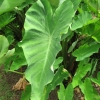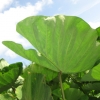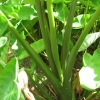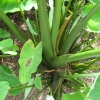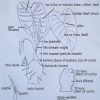Use As Food
Good table taro.
Distribution
Little-known variety of limited distribution.
General Characteristics
Tall, erect, stocky, maturing within 9 to 12 months, producing from 2 to 5 ‘ohā; identified by tall, upright, dark green Hā (Petiole) with distinct blackish edges, and horizontal Lau or Lū ‘au (Leaf blade).
Ha (Petiole)
80 to 95 cm. long, very dark green with indistinct, light green streaks, often slightly tinged with purple, conspicuously blackish at edge, white or greenish-white at kōhina (base).
Lau or Lu'au(Leaf Blade)
35 to 45 cm. long, 25 to 30 cm. wide, 35 to 40 cm, from tip to base of sinus (māwae), narrowly arrow head shaped, conspicuously concave (curve inward), horizontal, dark green; piko purple; round leaf section (lobes) obtuse, overlapping, with narrow lihi māwae (sinus).
'I'o kalo (Corm)
Flesh white with yellowish fibers; skin whitish.
Pua (Flower)
Hā (peduncle) dark green with brown flecking at kōhina (base); flower cover (spathe) 26 to 28 cm. long, the lower tubular portion 4 to 4.5 cm, long, dark green with purple at kōhina (base) and at constriction (skinny part of flower) and sometimes along margins, the upper portion dark yellow; spadix (spike of flower) 8.5 to 9 cm. long, the sterile appendage (tip of flower's spike) about 1 cm, long, orange as contrasted to the yellow flower sex organ (staminate) portion.
Remarks
The upright, erect habit of growth is similar to that of the Lauloa group. You can read about horticulturist Gerrit Parmile Wilder at the website: http://sites.google.com/site/uhmbotany/Home/employment/wilder-chair/brief-history-of-gp-wilder

